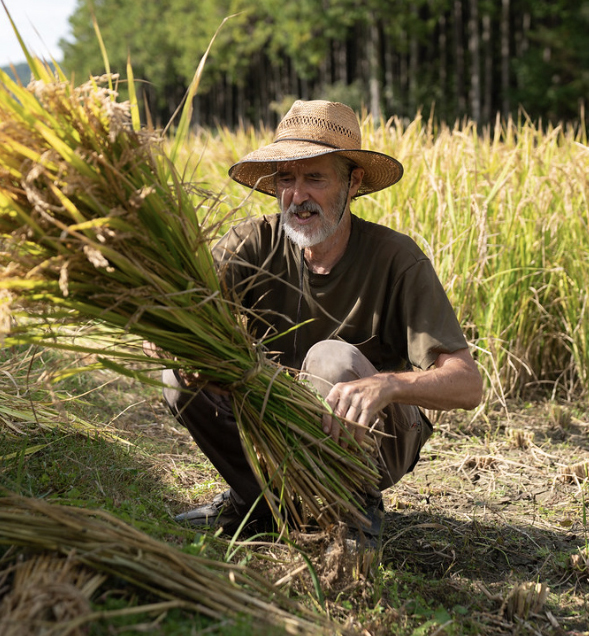By Simon Rowe
The City Fathers call Omoide Yokocho by its official name—Memory Lane. Locals prefer ‘Piss Alley’. For me it’s a little of both: a place to sip cheap beer on a hot evening, to reminisce of my wayward youth, and maybe shoot the breeze with another seasoned drinker. Because that’s all you’ll meet down this crooked alley crammed full of bars and izakaya which have survived the fire bombings of World War II, the wrecking balls, and the foolish whims of our city planners.
Make no mistake, an Omoide Yokocho drinkerie is little more than a two-storied wooden box with a ground-floor bar and a faded noren curtain to hide the afternoon barflies. Knots of cables and disused telephone lines hang crazily overhead. At night, sodium lamps push back the shadows just enough to offer safe passage between the red lanterns.
What’s not to like? On warm evenings, when the braziers fill the lane with their greasy smoke, you’ll know the soul of this city by its laughter and shouts, and calls for more chicken wings, hearts, and liver, and through this symphony of the working class, you might even hear the wail of some sodden soul singing enka—the Piss Alley blues.
Yarikuri has always been my haunt (the bar’s name means ‘to make ends meet’), but on account of losing my job, and my bill being unpaid since April, I’ve given it a wide berth. Still, I can’t keep away from Omoide Yokocho. It’s the drinkers and their stories that draw me back every time.
Take last night, for instance: I stepped into Yamamoto Sake-ten, a liquor store standing bar at the end of the alley. No sooner had I taken my place at the counter than the man beside me declared, ‘This summer heat is cooking my eggs.’
I threw him a sideways glance. He was somewhere north of seventy and wore a yellow-green Hawaiian shirt covered in red ukuleles. There was a straw Trilby perched on his head, and beneath it, eyebrows which bristled like the antennae on a night moth.
‘Pardon me?’ I replied.
‘I said, it’s hot!’
I nodded, and to the elderly woman behind the counter, said, ‘Mama, biru chodai.’ A frosted bottle and glass soon stood before me, and as I drank, the man lifted his own glass and swallowed in rapid gulps, like a mudskipper at low tide.
‘Who can stand such heat?’ he said, turning to me. ‘I’ll tell you who. See that guy in the corner? That’s Aoki-san. He was a UN peacekeeper in Africa, drove an armoured car all over the Namib desert chasing rebels. Forty degrees was a warm day! Then he came home and drove a bullet-proof limousine all over Tokyo for hotshots and VIPs. You know Whitney Houston?
I nodded.
‘Well, he even drove her.’
I drained my glass and poured it full.
‘And you think that’s something? His eyes widened. ‘Well, let me tell you that man beside the door drinking red wine, see? That’s Bono-sensei, a retired doctor. He delivered a baby on the Yamanote line once.’
I said, ‘Mama, mo ippon chodai.’ When my second bottle arrived, he leaned in closer and whispered, ‘But not everyone’s that clever, you know. See that guy in the blue linen jacket behind me? That’s Tanaka-san. He owned the Maharaja Disco in Kabukicho in the Bubble era, but couldn’t pay his gambling debts so the yakuza bought him out for a pittance. Now it’s a UNIQLO megastore!’
I took a dish of chilled tofu and shallots from the small refrigerator beside the counter.
‘Nakano-san,’ he murmured, watching me drizzle the tofu with soy sauce.
‘Sorry?’ I said.
‘Nakano-san loves tofu. He’s not here tonight, mind you. He used to captain a skipjack boat in the Indian Ocean. Out for months at a time. He’d sell his catch at Tsukiji and drink his profits here. He loved cold tofu. Shipwrecked twice he was—once in the Maldives, another time, the Andamans.’ He turned to me. ‘What do you do?’
‘I’m between jobs.’
He drained his glass and slapped the counter. ‘Mama, okanjo kudasai!’ The elderly woman flicked her abacus beads, then scribbled something on a scrap of paper. He paid, said something to her I couldn’t catch, and with the tip of his Trilby, disappeared into the heat of the alley.
The old woman cleared away his bottles and said, ‘I’m sorry. He does that sometimes.’
‘Does what?’
‘Introduces customers to his friends.’
I glanced around at the empty shop.
‘He’s the last of the old timers.’ She wiped off the counter and rearranged the soy sauce bottles.
I drained my bottle, thought about a third, but asked for the bill instead.
‘It’s been paid,’ she said without looking up.
******************
‘Otomodachi’ (Honorable friend) was a finalist in the Globe Soup 2021 Travel Writing Competition.
Simon Rowe is an Australian writer based in Himeji, Japan and is a 2021 International Rubery Book Award nominee, winner of the 2021 Best Indie Book Award and the 2013 Asian Short Screenplay Contest. His nonfiction has appeared in The Paris Review, the New York Times, TIME (Asia), the South China Morning Post, and The Australian. Website: https://www.mightytales.net/
For his previous contributions to WiK, see here, or here, or here, or here, or here.








Recent Comments